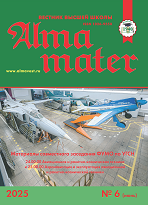https://doi.org/10.20339/AM.09-17.049
G.F. Shafranov-Kutsev is Dr.Sci. (Philosophy), scientific director of university e-mail: shafranov-kutsev@utmn.ru; and E.M. Cherkashov is Cand.Sci. (Sociology), doc. e-mail: emtch53@rambler.ru at Tyumen State University
Presented is analysis of the sphere of higher education, based on research of important socially significant functions of universities. The research is of theoretical character, and the main material of it is modern scientific and scientific publication discourse. The key method is qualitative content-analysis of various kinds of texts, related to research topic. Proposed is the notion of “competitive field” for in whole presentation and description of modern globalized hypercompetitive society and needed by it higher education. Also analyzed is the process of formation of modern Russian competitive field of the sphere of higher education, and in connection with that elaborated is desirable variant of evolution of such. Conclusion is made, that of special importance are further studies for identifying socio-cultural attitudes of competitive oriented and competitiveness of Russian youth.
Key words: sphere of higher education, competitiveness, hypercompetition, competitive field, sectoral (branch) market-oriented competitive business fields, competitive fields of locuses, global research universities, support universities.
References
1.The future of higher school in Russia: expert view. Analytical report. Krasnoyarsk, 2012.
2. Branding of territories. Best world practices. Moscow, 2013.
3. Bourdie, P. Social space: fields and practices. Moscow, 2005.
4. Zinov'yev, A.A. Zapad. Fenomen zapadnizma (2017). URL: https://www.e-reading.club/bookreader.php/88145/Zinov%27ev_- Zapad._Fenomen_zapadnizma.html
5. Itskovits, G. Triple spiral. Universities – enterprises – state. Innovations in action. Tomsk, 2010.
6. Karacharovsky, V.V., Shkaratan, O.I., Yastrebov, G.A. Culture and modernization in the mirror of interaction of Russian and foreign professionals in multi-national labor collectives in Russia. Sociological researches, 2014, no. 8, pp. 67–77.
7. Karacharovsky, V.V., Shkaratan, O.I., Yastrebov, G.A. Russian culture of labor and foreign influence. Moscow, 2015.
8. Kuzminov, Ya.I., Semenov, D.S., Frumin, I.D. Structures of high schools’ network: from Soviet to Russian “master plan”. Problems of education, 2013, no. 4, pp. 8–63.
9. Leshukov, O.V., Lisyutkin, M.A. Administration of regional systems of higher education in Russia: possible approaches. University administration: practice and analysis, 2015, no. 6 (100), pp. 29–40.
10. Marginson, S. Do rankings drive better performance?. URL: https://ihe.hse.ru/article/view/5566
11. Porter, M. International competitiveness. Moscow, 1993.
12. Porter, M. Competition. Moscow, 2002.
13. Rodionov, D.G., Kushneva, O.A., Rudskaya, I.A. Rating of universities as instrument in competitive struggle on world market of educational services. Innovations. 2013, no. 11 (181), pp. 89–97.
14. Sachuk, T.V. Territorial marketing. Saint Petersburg, 2009.
15. Traut, J. New positioning. Saint Petersburg, 2001.
16. Traut, J. Big brands, big problems. Sankt Petersburg, 2002.
17. Ukrainsky, V.N. Modern French space economic: theory of short range and typologization of local economic structures. Space economics, 2011, no. 2, pp. 92–126.
18. Shkaratan, O.I., Karacharovsky, V.V. Russian labor and administrative culture: experience of research in the context of perspectives of economical development. The world of Russia: Sociology, ethnology, 2002, no. 1, pp. 3–56.
19. 15 Global trends of change in People's lives from Pirogov's Office. URL: http://revision.ru/s/pirogov/
20. Doing Business Comparing Business Regulation for Domestic Firms in 190 Economies 2017. URL: http://www.doingbusiness.org/reports/global-reports/doing-business-2017
21. Global Competitiveness Report2016–2017. URL: http://www3.weforum.org/docs/GCR2016-2017/05FullReport/TheGlobalCompetitivenessReport2016-2017_FINAL.pdf
22. Global Entrepreneurship Monitor, GEM 2015/2016. URL: http://www.gemconsortium.org/report/49480
23. The Global Talent Competitiveness Index. URL: https://www.insead.edu/news/2017-global-talent-competitiveness-index-davos
24. The world’s top 100 non-financial MNEs, ranked by foreign assets, 2016. The top 100 non-financial MNEs from developing and transition economies, ranked by foreign assets, 2015. URL: http://unctad.org/en/PublicationChapters/wir2017_AnnexTables_en.pdf












.png)






